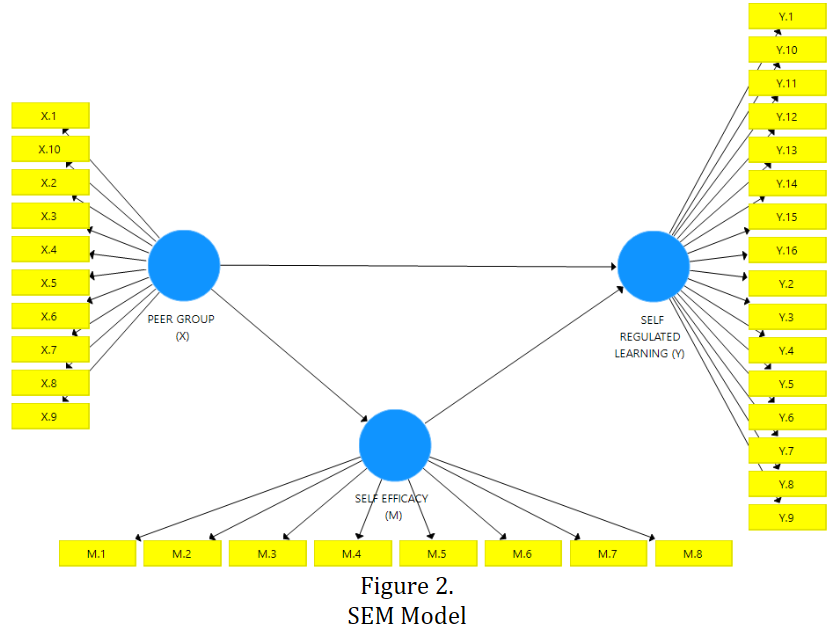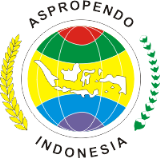THE MEDIATING ROLE OF SELF-EFFICACY ON THE EFFECT OF PEER GROUP ON SELF-REGULATED LEARNING
DOI:
https://doi.org/10.23917/jpis.v34i2.5152Keywords:
Peer group, self-efficacy, self-regulated learningAbstract
This study aims to determine the role of self-efficacy in mediating peer groups on self-regulated learning. The theory used is Social Cognitive Theory of Self-regulation. The population amounted to 358 students so that the sampling technique amounted to 189 accounting education students of Universitas Pendidikan Indonesia. Data collection using a questionnaire. Data analysis techniques using Structural Equation Modeling (SEM) with Smart PLS 3 because Smart PLS 3 can measure a small population. The results showed that peer group has a positive and significant influence on self-regulated learning, peer group has a positive and significant influence on self-efficacy, self-efficacy has a positive and insignificant effect on self-regulated learning, and self efficacy does not mediate the effect of peer group on self-regulated learning. The benefit of these findings for society is the creation of individuals who are more independent, confident, and able to regulate their own learning. Students who have good self-regulated learning skills and high self-efficacy tend to be more able to face academic and professional challenges more effectively.
Downloads
References
Alghamdi, A., Karpinski, A. C., Lepp, A., & Barkley, J. (2020). Online and Face-to-face Classroom Multitasking and Academic Performance: Moderated Mediation with Self-Efficacy for Self-Regulated Learning and Gender. Computers in Human Behavior, 102, 214–222. https://doi.org/10.1016/j.chb.2019.08.018.
Ali, M., & Asrori, M. (2017). Psikologi Remaja Perkembangan Peserta Didik. Jakarta: Bumi Aksara.
Amidah. (2022). Pengaruh Efikasi Diri dan Teman Sebaya Terhadap Kemandirian Belajar Pada Mahasiswa Pendidikan Ekonomi Undana. Journal Economic Education, Business and Accounting (JEEBA), 1(2), 60–65.
Anggraini, D., & Tusyanah, S. (2023). Pengaruh Motivasi Belajar, Sarana dan Prasarana dan Lingkungan Keluarga ter-hadap Kemandirian Belajar dengan Efikasi Diri sebagai Variabel Mediasi. Business and Accounting Education Journal (BAEJ), 4(2), 155–171. https://doi.org/10.15294/baej.v4i2.68896.
Arista, M., Sadjiarto, A., & Santoso, T. N. B. (2022). Pengaruh Motivasi Belajar dan Teman Sebaya terhadap Kemandirian Belajar Pelajaran Ekonomi pada Pembelajaran Daring di Masa Pandemi. Jurnal Basicedu, 6(4), 7334–7344. https://doi.org/10.31004/basicedu.v6i4.3499.
Balapumi, R., von Konsky, B. R., Aitken, A., & McMeekin, D. A. (2016). Factors Influencing University Students’ Self-Regulation of Learning. Proceedings of the Australasian Computer Science Week Multiconference, 1–9. https://doi.org/10.1145/2843043.2843067.
Bandura, A. (1986). Social Foundations of Thought and Action: A Social Cognitive Theory. In Social foundations of thought and action: A social cognitive theory. Prentice-Hall, Inc.
Bandura, A. (1991). Self-efficacy Conception of Anxiety. In Anxiety and self-focused attention. (pp. 89–110). Harwood Academic Publishers.
Bandura, A. (1998). Self Efficacy. In I. H. Friedman (Ed.), Encyclopedia of Mental Health. Academis Press.
Desmita. (2009). Panduan bagi Orang Tua dan Guru dalam Memahami Psikologi Anak Usia SD, SMP, dan SMA. Bandung: PT. Remaja Rosdakarya.
Ghozali, I. (2016). Aplikasi Analisis Multivariete Dengan Program IBM SPSS 23. Semarang: Badan Penerbit Universitas Diponegoro.
Ghozali, I., & Latan, H. (2014). Partial Least Squares Konsep, Metode dan Aplikasi Menggunakan Program WARPPLS 4.0. Semarang: Badan Penerbit Universitas Diponegoro.
Hu, L., & Bentler, P. M. (1999). Cutoff Criteria for Fit Indexes in Covariance Structure Analysis: Conventional Criteria Versus New Alternatives. Structural Equation Modeling, 6(1), 1–55. https://doi.org/10.1080/10705519909540118.
I Nyoman Paska, P. E., & Laka, L. (2020). Pengaruh Lingkungan Sosial Terhadap SelfRegulated Learning Siswa. SAPA - Jurnal Kateketik Dan Pastoral, 5(2), 39–54. https://doi.org/10.53544/sapa.v5i2.133.
Jariyah, A., & Rochmawati, R. (2020). Pengaruh Pengetahuan Awal Akuntansi, Kecerdasan Emosional dan Efikasi Diri Terhadap Tingkat Pemahaman Akuntansi. Jurnal Pendidikan Akuntansi (JPAK), 8(1), 9–16. https://doi.org/10.26740/jpak.v8n1.p9-16.
Karmila, N., & Raudhoh, S. (2021). Pengaruh Efikasi Diri Terhadap Kemandirian Belajar Siswa. Pedagonal: Jurnal Ilmiah Pendidikan, 5(1), 36–39. http://journal.unpak.ac.id/index.php/pedagonal.
Laili, N. (2021). Pengaruh Self-Efficacy dan Motivasi Belajar Terhadap Kemandirian Belajar Matematika. Afeksi: Jurnal Penelitian Dan Evaluasi Pendidikan, 2(2), 98–103. https://doi.org/10.35672/afeksi.v2i2.35.
Macek, P., & Jeek, S. (2007). Adolescents’ Assessments of Parents and Peers: Relationships Toself-Esteem and Self-Efficacy. Retrieved from https://api.semanticscholar.org/CorpusID:53056190.
Masrotin, M., & Wahjudi, E. (2021). Peran Efikasi Diri Dalam Memediasi Pengaruh Pengenalan Lapangan Persekolahan (PLP) dan Persepsi Profesi Guru Terhadap Minat Menjadi Guru Akuntansi. Jurnal Pendidikan Akuntansi (JPAK), 9(2), 178–189. https://doi.org/10.26740/jpak.v9n2.p178-189.
Montroy, J. J., Bowles, R. P., & Skibbe, L. E. (2016). The Effect of Peers’ Self-Regulation on Preschooler’s Self-Regulation and Literacy Growth. Journal of Applied Developmental Psychology, 46, 73–83. https://doi.org/10.1016/j.appdev.2016.09.001.
Oktariani, O., Munir, A., & Aziz, A. (2020). Hubungan Self Efficacy dan Dukungan Sosial Teman Sebaya Dengan Self Regulated Learning Pada Mahasiswa Universitas Potensi Utama Medan. Tabularasa: Jurnal Ilmiah Magister Psikologi, 2(1), 26–33. https://doi.org/10.31289/tabularasa.v2i1.284.
Olasehinde, K. J., & Olatoye, R. A. (2014). Self-Regulation and Peer Influence as Determinants of Senior Secondary School Students’ Achievement in Science. Mediterranean Journal of Social Sciences. 5(7), 374-380. https://doi.org/10.5901/mjss.2014.v5n7p374.
Rachmaningtyas, A. T., & Khoirunnisa, R. N. (2022). Hubungan Antara Dukungan Sosial Teman Sebaya dan Self-Regulated Learning Pada Mahasiswa Tahun Pertama di Masa Pandemi Covid-19. Character: Jurnal Penelitian Psikologi, 9(1), 34–45.
Richardson, M., Abraham, C., & Bond, R. (2012). Psychological Correlates of University Students’ Academic Performance: A Systematic Review and MetaAnalysis. Psychological Bulletin, 138(2), 353–387. https://doi.org/10.1037/a0026838.
Santosa, S. (2006). Dinamika Kelompok. Jakarta: Bumi Aksara.
Santrock, J. W. (2007). Perkembangan Anak Jilid 1 Edisi Kesebelas. Jakarta: PT. Erlangga.
Saragih, F. (2020). Pengaruh Lingkungan Terhadap Kemandirian Belajar. Jurnal Pendidikan PKN Pancasila Dan Kewarganegaraan, 1(2), 62–72.
Sihotang, J. A. T. (2019). Efek Mediasi Efikasi Diri Pada Pengaruh Pola Asuh Orang Tua Dan Kelompok Teman Sebaya (Peer Group) Terhadap Kemandirian Belajar: Survey Pada Siswa Kelas XI IPS SMA Negeri di Kota Cimahi. S2 Thesis, Universitas Negeri Medan. http://repository.upi.edu/41254/.
Sobri, M., Nursaptini, N., & Novitasari, S. (2020). Mewujudkan Kemandirian Belajar Melalui Pembelajaran Berbasis Daring Diperguruan Tinggi Pada Era Industri 4.0. Jurnal Pendidikan Glasser, 4(1), 64-71. https://doi.org/10.32529/glasser.v4i1.373.
Sumuer, E. (2018). Factors Related to College Students’ Self-Directed Learning with Technology. Australasian Journal of Educational Technology, 34(4), 29-43. https://doi.org/10.14742/ajet.3142.
Usher, E. L., & Pajares, F. (2008). Sources of Self-Efficacy in School: Critical Review of the Literature and Future Directions. Review of Educational Research, 78(4), 751–796. https://doi.org/10.3102/0034654308321456.
Zimmerman, B. J. (1989). A Social Cognitive View of Self-Regulated Academic Learning. Journal of Educational Psychology, 81(3), 329–339. https://doi.org/10.1037/0022-0663.81.3.329.
Zimmerman, B. J., & Kitsantas, A. (2005). The Hidden Dimension of Personal Competence: Self-Regulated Learning and Practice. In Handbook of competence and motivation. (pp. 509–526). Guilford Publications.

Downloads
Submitted
Accepted
Published
Issue
Section
License
Copyright (c) 2024 Jurnal Pendidikan Ilmu Sosial

This work is licensed under a Creative Commons Attribution 4.0 International License.













